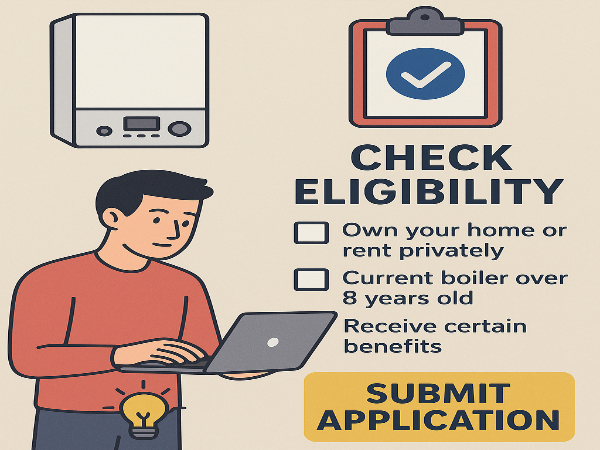Common Mistakes That Delay Boiler Grant Approval

Getting help to replace your old or broken boiler is a great idea. Boiler grants under schemes like the ECO (Energy Company Obligation) can make this possible for many UK households. These grants help you get free boilers or heavily discounted replacements if you meet certain rules.
But many people face delays during the process. Sometimes, they even get rejected after waiting weeks. Most of the time, this happens due to simple, avoidable mistakes.
This blog will guide you through the most common reasons why your free boiler scheme application might get delayed. We’ll also show you how to avoid these mistakes so you can get your new boiler faster.
Not Checking Eligibility First
The biggest mistake people make is skipping the eligibility check. You must meet specific criteria to qualify for a boiler grant. If you don’t meet these conditions, your application may get delayed or denied.
What you need to check:
- Do you own or privately rent your home?
- Is your current boiler more than 8 years old or not working properly?
- Do you or someone in the house receive certain benefits?
- Is your home connected to the gas supply?
Tip:
Use an online eligibility checker before you apply. Many websites offering free boilers have this tool. It only takes a minute and can save you weeks of waiting.
Providing Incorrect or Incomplete Information
Small errors can cause big delays. Filling in the wrong income details, leaving out benefits information, or entering an old address can all cause issues. Some applications get rejected without notice just because of missing or wrong info.
Common info mistakes:
- Misspelling your name or address
- Listing outdated boiler types
- Forgetting to tick benefit boxes
- Not uploading required documents
Tip:
Double-check every form before you submit. Keep your energy bills, benefit letters, and ID handy to avoid mistakes.
Not Sending the Right Documents
When applying for a boiler grants Wales, you usually need to show proof of your benefits or household income. Many people forget this step or send documents that don’t meet the guidelines.
Documents that might be needed:
- Benefit award letters (dated within the last 12 months)
- Proof of ownership or rental agreement
- Gas or energy bills
- Photo of the current boiler
If your documents are blurry, expired, or missing pages, your application may be put on hold.
Tip:
Scan your documents clearly. Avoid taking dark or unclear photos. Make sure everything is up to date.
Applying Through Unreliable Sources
There are many websites and companies offering free boilers through government schemes. But not all of them are trustworthy or registered. If you apply through the wrong company, your grant might be delayed—or worse, you might never hear back.
How to spot a reliable installer:
- Are they approved under the ECO scheme?
- Do they offer a proper home survey?
- Can they provide reviews or references?
- Do they ask for money upfront? (They shouldn’t.)
Tip:
Use providers listed on official UK government websites or large energy companies’ partner lists.
Ignoring Home Survey Appointments
A home survey is a key part of getting your boiler grant. After your first application is accepted, the installer usually arranges a visit. They need to check your home, the boiler, and your insulation. Many people miss this appointment or cancel last minute.
When this happens, your application gets delayed or canceled.
Tip:
Once the survey is scheduled, make sure someone is home. If you must reschedule, give them as much notice as possible.
Boiler Doesn’t Meet the Age Requirement
Most grant schemes require your boiler to be old or broken. If your boiler is fairly new or recently repaired, your application might get denied.
Even if your heating bills are high, you may not qualify unless your boiler:
- Is over 8 years old
- Is rated as inefficient
- Has key parts missing or broken
Some people don’t know their boiler’s age and guess it. This can lead to issues.
Tip:
Find your boiler’s make and model. The manufacturer’s website often shows the year it was made.
Not Claiming the Right Benefits
One major part of qualifying for free boilers is receiving specific government benefits. If you or someone in your home gets benefits, make sure they are on the approved list.
Approved benefits usually include:
- Universal Credit
- Pension Credit
- Child Tax Credit
- Working Tax Credit
- Income Support
- Employment and Support Allowance (ESA)
- Jobseeker’s Allowance (JSA)
Sometimes people claim benefits like Housing Benefit or Carer’s Allowance but these may not qualify on their own unless the scheme rules change.
Tip:
Always check the most up-to-date list of qualifying benefits. Rules can change year by year.
Not Having Proper Insulation
ECO boiler grants often require your home to be energy-efficient—or at least able to improve. If your home lacks proper insulation, such as cavity wall or loft insulation, it could delay or stop your boiler grant approval.
This is because the scheme wants homes to benefit the most from energy upgrades. A new boiler without insulation won’t save much energy.
Tip:
Ask the installer about insulation during your survey. Some providers will install both boiler and insulation under the same grant.
Trying to Rush the Process
Everyone wants a warm home and lower bills. But rushing your boiler grant application can lead to mistakes, missed steps, or skipped requirements.
The full process usually takes a few weeks:
- Check eligibility
- Submit correct documents
- Book the home survey
- Wait for approval
- Schedule the boiler installation
If you try to push things too fast, your installer might put your file on hold or move to the next applicant.
Tip:
Be patient but stay in touch. Follow up politely if you don’t hear back in 7–10 working days.
Not Following Up After Submission
Once you apply, it’s easy to forget about it and wait. But sometimes, your application might be missing one detail, and no one will contact you unless you check in.
If you don’t hear anything after a week or two, reach out. It might just take a quick email or phone call to fix a small issue.
Tip:
Set reminders to follow up. Ask for a timeline of the next steps so you know what to expect.
Not Understanding the Scheme Rules
Each year, the ECO scheme can change. New rules may apply, or new benefits may qualify. If you rely on old information from forums or blogs, you might be misinformed.
Some people apply thinking the grant will cover everything when it might only offer partial support or require a small top-up fee.
Others think they can choose any type of boiler or brand, which isn’t always true under grant schemes.
Tip:
Always read the fine print and ask the installer questions. Make sure you understand what the grant covers and what it doesn’t.
Moving Homes During the Process
If you move out or change addresses during the application, it can complicate things. The grant is tied to your home, not just you. If you change your details midway, your application may have to start over.
Also, some schemes don’t apply to newly built homes or social housing.
Tip:
Only apply if you plan to stay in your current home for at least the next few months.
Final Thoughts
Getting free boilers through government grants is a great opportunity, especially with rising energy bills. But to avoid delays, you must be careful, honest, and prepared.
Most delays happen because of small issues: wrong documents, missed surveys, or applying through unreliable sources. The good news is, all of these can be fixed or prevented.
If you’re serious about getting help with your boiler, take your time during the application. Work with trusted providers, and always double-check your information.
The sooner you get approved, the sooner you can enjoy a warm, energy-efficient home—and lower your heating bills.



